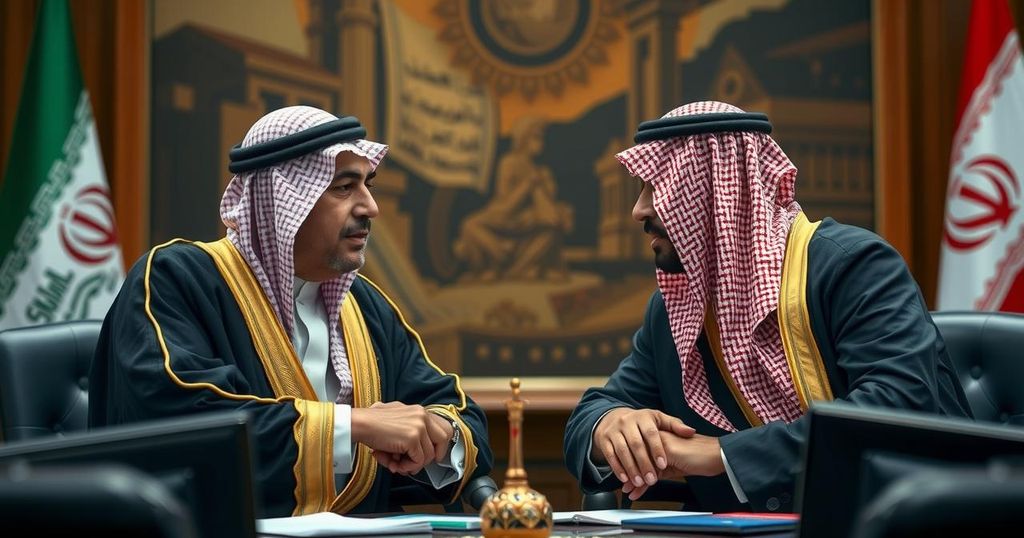Saudi Arabia Seeks Closer Ties with Iran Amid U.S. Political Changes

Saudi Crown Prince Mohammed bin Salman is urgently seeking to enhance relations with Iran as Donald Trump returns to the White House. An offer for increased trade aims to reduce tensions, building on an earlier Chinese-mediated rapprochement. Potential trade is likely to focus on food and medical sectors, avoiding U.S. sanctions. Ultimately, these diplomatic moves are part of a broader strategy linked to Saudi Vision 2030, emphasizing economic diversification.
Saudi Crown Prince Mohammed bin Salman is reportedly making urgent efforts to reinforce relations with Iran ahead of the anticipated return of Donald Trump to the White House. According to a Bloomberg report, the Crown Prince has put forth an “offer of increased trade” to Iranian officials, aiming to de-escalate tensions with Western nations. This initiative follows a rapprochement brokered by China in March 2023, marking an effort by both Tehran and Riyadh to solidify their ties amidst heightened regional tensions.
Details regarding the specifics of the offer remain unclear; however, it is suggested that potential trade avenues may initially concentrate on the food and medical sectors, effectively circumventing European and U.S. sanctions imposed on Iran. The report highlights the implications of Trump’s recent electoral victory, which may signal a resurgence of stringent U.S. policies toward Iran, including possible reinstatement of the maximum pressure campaign from his prior administration.
In light of these developments, Crown Prince Mohammed has engaged his National Security Adviser, Musaad al-Aiban, for discussions in Washington prior to President Joe Biden’s transition in January. The Saudi leadership perceives a dual-track approach of fostering closer ties with both Washington and Tehran as critical for geopolitical stability, albeit it may position the kingdom in a diplomatically sensitive space.
The Crown Prince’s overarching goal revolves around the trillion-dollar Vision 2030 agenda designed to diversify Saudi Arabia’s economy beyond its oil reliance, necessitating peace and foreign investments to fund its ambitious projects. Speaking at an investment conference in late October, Foreign Minister Prince Faisal bin Farhan emphasized his mandate to protect and advance Vision 2030.
Despite the potential for closer ties, Iranian officials express skepticism regarding Saudi Arabia’s prior commitments to trade and investment agreements stemming from the Beijing pact. China, a significant oil purchaser from both nations, has been advocating for the enhancement of relations between Riyadh and Tehran, marking this as a straightforward method for Saudi Arabia to signify its dedication to dialogue with Iran.
Reports indicate that a follow-up committee from Saudi Arabia, China, and Iran convened in Riyadh recently to reaffirm commitment to their accords. A notable highlight of burgeoning relations includes the nearly 140,000 Iranian pilgrims who have visited Saudi Arabia’s Islamic holy sites this year, alongside the hosting of Iranian exhibitions in the kingdom. The diplomatic re-engagement between Iran and Saudi Arabia commenced after a seven-year hiatus, facilitated by a Beijing-mediated agreement in March 2023, leading to a recommitment to mutual respect and non-interference in internal matters.
The article discusses the evolving diplomatic ties between Saudi Arabia and Iran, particularly in light of the geopolitical shifts resulting from recent U.S. elections. The Crown Prince’s strategic efforts to build economic ties with Iran are positioned against the backdrop of prior hostilities and the emergence of a new administration in the U.S. that may alter the dynamics in the Middle East. The Chinese-brokered agreement earlier in 2023 has set the stage for this renewed dialogue, yet concerns remain regarding the fulfillment of trade commitments.
In conclusion, Saudi Arabia’s efforts to strengthen ties with Iran reflect a strategic maneuver motivated by geopolitical considerations, especially with the impending return of Donald Trump to the U.S. presidency. The attempt to enhance trade relations, particularly in non-sanctionable sectors, serves as a foundation for stabilizing interactions between the two nations amid broader regional tensions. The success of this initiative may depend on maintaining dialogue and follow-through on previous commitments, notably influenced by external powers like China.
Original Source: www.presstv.ir








